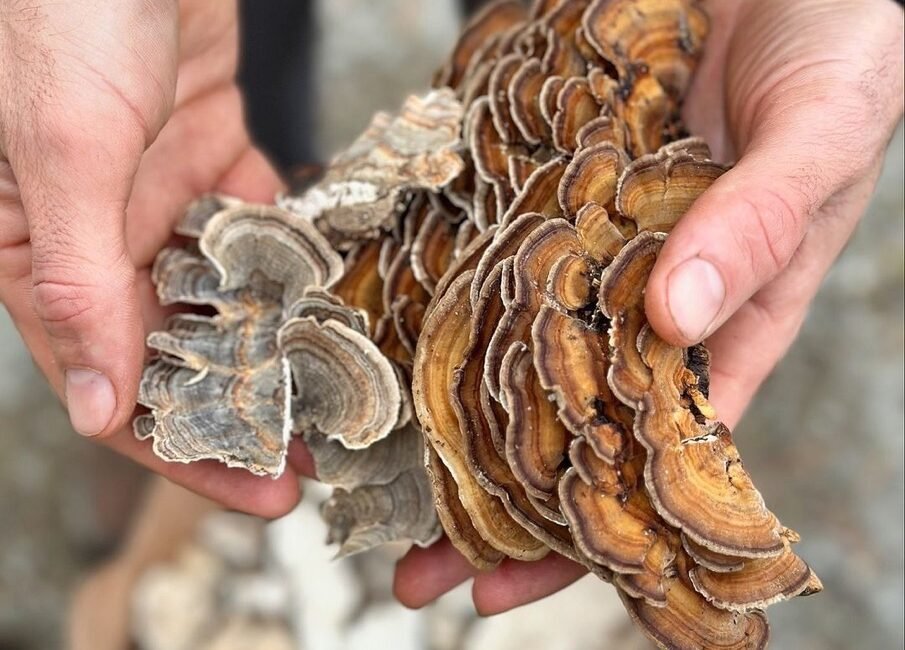Health Benefits
- Strong anti-viral, anti-inflammatory, anti-oxidative, and immunostimulating properties (Jedrezjewsky, et. al., 2023).
- Beneficial for cancer and viral infections recovery (Jedrezjewsky, et. al., 2023).
- Improves the antitumor immune ability in Gastric Cancer (Dan et al., 2023).
- Used in cancer and immunotherapy, inflammatory and Central Nervous System (CNS) diseases, among others (Habtamariam, 2020).
- PSP, PSK, and other polysaccharides have been established to induce direct cytotoxicity to cancer/tumour cells (Habtamariam, 2020).
- Increased release of cytokines such as TNF-α has direct implications for tumour cell killing (Habtamariam, 2020).
- Potential use of CV compounds in anti-viral treatment, including therapy against COVID-19 disease (Jedrezjewsky, et. al., 2023).
- Rich in polysaccharides, particularly beta-glucans, turkey tail mushrooms have immune-boosting properties (Higgs, 2023) (Higgs is not peer-reviewed)
- Used for supportive care in cancer treatment for dogs (Higgs, 2023). (Higgs is not peer-reviewed)
- Effective antimicrobial and anti-inflammatory activity (Bains & Chawla, 2020).
- Over 35 different phenolic compounds in a sample of turkey tail mushroom extract, along with the flavonoid antioxidants quercetin and baicalein (Janjušević et. al., 2017).
- Krestin (PSK) and Polysaccharide Peptide (PSP) are two polysaccharopeptides found in turkey tails (Blagodatski et al., 2018).
- PSK stimulates dendritic cells, which promote immunity to toxins, and regulate the immune response. In addition, PSK activates natural killer cells, a type of white blood cell that helps protect against pathogens and cancerous tumours (Lu et al., 2011).
- PSP increases monocytes, which are types of white blood cells that fight infection and boost immunity (Saleh et al., 2017).
- Used as anticancer agents in conjunction with surgery, chemotherapy, radiation, or a combination of these treatments (Chang et al., 2017).
- Antitumour activity in mice (Awadasseid et al., 2017)
- Contains prebiotics and has a positive effect on the gut microbiome (Saleh et al., 2017).
- A study done on 91 women shows it may combat HPV (Serrano et al. 2021).
References
Awadasseid, A., Hou, J., Gamallat, Y., Xueqi, S., Eugene, K. D., Musa Hago, A., Bamba, D., Meyiah, A., Gift, C., & Xin, Y. (2017). Purification, characterization, and antitumor activity of a novel glucan from the fruiting bodies of Coriolus Versicolor. PloS one, 12(2), e0171270. https://doi.org/10.1371/journal.pone.0171270
Bains, A., & Chawla, P. (2020). In vitro bioactivity, antimicrobial and anti-inflammatory efficacy of modified solvent evaporation assisted Trametes versicolor extract. 3 Biotech, 10(9), 404. https://doi.org/10.1007/s13205-020-02397-w
Blagodatski, A., Yatsunskaya, M., Mikhailova, V., Tiasto, V., Kagansky, A., & Katanaev, V. L. (2018). Medicinal mushrooms as an attractive new source of natural compounds for future cancer therapy. Oncotarget, 9(49), 29259–29274. https://doi.org/10.18632/oncotarget.25660
Chang Y, Zhang M, Jiang Y, Liu Y, Luo H, Hao C, Zeng P, Zhang L. Preclinical and clinical studies of Coriolus versicolor polysaccharopeptide as an immunotherapeutic in China. Discov Med. 2017 Apr;23(127):207-219. PMID: 28595034.
Dan, A., Swain, R., Belonce, S., & Jacobs, R. J. (2023). Therapeutic Effects of Medicinal Mushrooms on Gastric, Breast, and Colorectal Cancer: A Scoping Review. Cureus, 15(4), e37574. https://www.ncbi.nlm.nih.gov/pmc/articles/PMC10183216/
Habtemariam, S. (2020). Trametes versicolor (Synn. Coriolus versicolor ) Polysaccharides in Cancer Therapy: Targets and Efficacy. Biomedicines, 8(5), 135-. https://doi.org/10.3390/biomedicines8050135
Habtemariam S. Trametes versicolor (Synn. Coriolus versicolor) Polysaccharides in Cancer Therapy: Targets and Efficacy. Biomedicines. 2020; 8(5):135. https://doi.org/10.3390/biomedicines8050135
Janjušević, L., Karaman, M., Šibul, F., Tommonaro, G., Iodice, C., Jakovljević, D., & Pejin, B. (2017). The lignicolous fungus Trametes versicolor (L.) Lloyd (1920): a promising natural source of antiradical and AChE inhibitory agents. Journal of enzyme inhibition and medicinal chemistry, 32(1), 355–362. https://doi.org/10.1080/14756366.2016.1252759
Jędrzejewski T, Pawlikowska M, Sobocińska J, Wrotek S. COVID-19 and Cancer Diseases—The Potential of Coriolus versicolor Mushroom to Combat Global Health Challenges. International Journal of Molecular Sciences. 2023; 24(5):4864. https://www.mdpi.com/1422-0067/24/5/4864
Higgs, V. 2023. Medicinal mushrooms for dogs. PetMD. https://www.petmd.com/dog/general-health/medicinal-mushrooms-for-dogs
Lu, H., Yang, Y., Gad, E., Inatsuka, C., Wenner, C. A., Disis, M. L., & Standish, L. J. (2011). TLR2 agonist PSK activates human NK cells and enhances the antitumor effect of HER2-targeted monoclonal antibody therapy. Clinical cancer research: an official journal of the American Association for Cancer Research, 17(21), 6742–6753. https://doi.org/10.1158/1078-0432.CCR-11-1142
Saleh, M. H., Rashedi, I., & Keating, A. (2017). Immunomodulatory Properties of Coriolus versicolor: The Role of Polysaccharopeptide. Frontiers in immunology, 8, 1087. https://doi.org/10.3389/fimmu.2017.01087
Serrano, L., López, A.C., González, S. P., Palacios, S., Dexeus, D., Centeno-Mediavilla, C., Coronado, P., de la Fuente, J., López, J. A., Vanrell, C., Cortés, J. (2021). Efficacy of a Coriolus versicolor–Based Vaginal Gel in Women With Human Papillomavirus–Dependent Cervical Lesions: The PALOMA Study. Journal of Lower Genital Tract Disease 25(2):p 130-136. https://journals.lww.com/jlgtd/Fulltext/2021/04000/Efficacy_of_a_Coriolus_versicolor_Based_Vaginal.9.aspx

